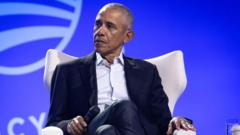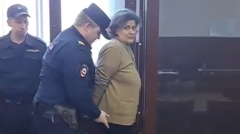In a recent interview, Zelensky emphasized the necessity of witnessing the devastation caused by the war, urging Trump's presence in the country to understand the impact on civilians and military personnel. This call comes in the wake of a tragic missile strike in Sumy, resulting in significant casualties.
Zelensky Invites Trump to Ukraine Amid Ongoing Conflict with Russia

Zelensky Invites Trump to Ukraine Amid Ongoing Conflict with Russia
Ukrainian President Volodymyr Zelensky has formally invited former U.S. President Donald Trump to visit Ukraine before any negotiations with Russia.
As hostilities continue, international leaders are condemning Russia's actions while the United States pursues diplomatic efforts to secure a ceasefire.
In the wake of a fresh Russian missile attack on Sumy, which resulted in at least 35 fatalities and numerous injuries, Ukrainian President Volodymyr Zelensky has extended an invitation to former U.S. President Donald Trump to visit Ukraine prior to any agreements made with Russia regarding a resolution to the conflict. In a CBS News interview for the program "60 Minutes," Zelensky stated, "Please, before any kind of decisions, any kind of forms of negotiations, come to see people, civilians, warriors, hospitals, churches, children destroyed or dead." He recorded this statement shortly before the recent deadly missile strike in Sumy, underscoring the gravity of the situation.
Russia has claimed that the attack targeted a gathering of Ukrainian soldiers, alleging high casualties among military personnel. However, these claims have not been substantiated by Ukrainian officials, who express concern over the safety of military gatherings amid the ongoing conflict. The missile strike, which resulted in the destruction of a conference center in Sumy, further emphasizes the ongoing danger faced by both civilians and soldiers in war-torn Ukraine. Zelensky's invitation to Trump highlights a potentially significant moment for U.S.-Ukraine relations as Trump's administration seeks to navigate a path toward peace through negotiations.
International responses to the attack have been swift and condemnatory. European leaders, including Germany's future Chancellor Friedrich Merz and French President Emmanuel Macron, have condemned Russia's actions as war crimes and violations of international law. The European Commission President, Ursula von der Leyen, emphasized the need for strong measures to enforce a ceasefire, reiterating that Russia remains the aggressor in this conflict.
As the situation continues to evolve, the international community watches closely how relations between the U.S., Ukraine, and Russia unfold. With military aid pledges from Ukraine's allies and ongoing diplomatic discussions, the prospect for resolving the conflict remains complex and fraught with challenges. As Zelensky calls on Trump to bear witness to the realities of war in Ukraine, the responses from both sides will be pivotal in determining the future of the region and the effectiveness of diplomatic efforts.
In the wake of a fresh Russian missile attack on Sumy, which resulted in at least 35 fatalities and numerous injuries, Ukrainian President Volodymyr Zelensky has extended an invitation to former U.S. President Donald Trump to visit Ukraine prior to any agreements made with Russia regarding a resolution to the conflict. In a CBS News interview for the program "60 Minutes," Zelensky stated, "Please, before any kind of decisions, any kind of forms of negotiations, come to see people, civilians, warriors, hospitals, churches, children destroyed or dead." He recorded this statement shortly before the recent deadly missile strike in Sumy, underscoring the gravity of the situation.
Russia has claimed that the attack targeted a gathering of Ukrainian soldiers, alleging high casualties among military personnel. However, these claims have not been substantiated by Ukrainian officials, who express concern over the safety of military gatherings amid the ongoing conflict. The missile strike, which resulted in the destruction of a conference center in Sumy, further emphasizes the ongoing danger faced by both civilians and soldiers in war-torn Ukraine. Zelensky's invitation to Trump highlights a potentially significant moment for U.S.-Ukraine relations as Trump's administration seeks to navigate a path toward peace through negotiations.
International responses to the attack have been swift and condemnatory. European leaders, including Germany's future Chancellor Friedrich Merz and French President Emmanuel Macron, have condemned Russia's actions as war crimes and violations of international law. The European Commission President, Ursula von der Leyen, emphasized the need for strong measures to enforce a ceasefire, reiterating that Russia remains the aggressor in this conflict.
As the situation continues to evolve, the international community watches closely how relations between the U.S., Ukraine, and Russia unfold. With military aid pledges from Ukraine's allies and ongoing diplomatic discussions, the prospect for resolving the conflict remains complex and fraught with challenges. As Zelensky calls on Trump to bear witness to the realities of war in Ukraine, the responses from both sides will be pivotal in determining the future of the region and the effectiveness of diplomatic efforts.






















